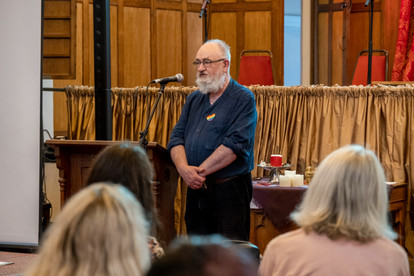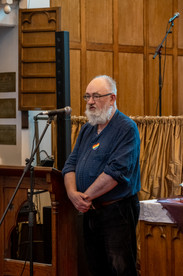Thoughts on ArtBomb by Rev Tom
- ArtBomb
- Jul 31, 2021
- 5 min read
Rev Tom Cready of the Unitarian Church on Hall Gate who generously hosted ArtBomb'21
The great Soviet film director Andrei Tarkovsky has said:
“The artist exists because the world is not perfect. Art would be useless if the world were perfect, as we wouldn't look for harmony but simply live in it. Art is born out of an ill-designed world. Maybe we are here to enhance ourselves spiritually. If our life tends to this spiritual enrichment, then art is a means to get there. Art should help us in this process. Art enriches our own spiritual capabilities,"
I would say the same about religion. Religion enriches our spiritual capabilities; religion addresses our incomplete, unfinished state while giving us a voice to express our longing for completion; for release from the restless searching for affirmation in that moment of self-acceptance; that moment of self-transcendent joy that C. S. Lewis defined as “an unsatisfied desire that is itself more satisfying than any other desire”.
And in religion, as in art, the understanding conveyed by the literal and the factual can be both limited and manipulated, and the abstract and the atmospheric, the symbolic and the suggestive can be more evocative and more inclusive, and can invite a more active and fulfilling engagement.
Religion is not about creed or dogma, ritual or ceremony, practice or observance. All those things are culturally specific, and they may be wonderful and beautiful in themselves; but they are not essential. The heart of religion, the living breathing, universal heart of religion is the capacity to provide food for the mind, medicine for the soul, and fuel for our creative fire. This is what religion has in common with art; religious ideas, religious images and religious language can do what the literary, visual and dramatic arts can do: what stories, songs, painting, poetry; including the poetry of performance as well as the poetry of words can do. Which is not simply to convey information but provide an insight into what life is like for people whose circumstances are very different; not an explanation of what it means; and not a description of how it looks but an evocation of how it feels - an invitation to enter into an imaginative sympathy with an experience of life that is not our own.
I am careful how I use the word ‘religion’. The word is often used to refer to a system of social and personal conformity determined by the dominant culture and to a set of sanctions intended to enforce that conformity.
I use the word ‘religion’ to challenge social and cultural conformity; to reach out for ways of living that are more generous, honest and tolerant, where we are not condemned to compete against each other for pride of possession or pride of position in a constant pantomime of judging and being judged. I use the word ‘religion’ refer to the process of exploration and expression of all the possibilities of a relationship between the personal and the universal; between the intimate and the ultimate.
A religious sensibility that does not seek to perpetuate a set of mythologies but to respond to changing human needs and growing human knowledge has something else in common with art. I do not speak of great art, fine art, high art or any other category of art except one: honest art. Art as so powerfully and beautifully exemplified by Lorna Collins and Lucy Taylor during Artbomb.
Art and religion can find the lost, lift up the fallen and heal the wounded.
I absolutely loved the comment made during a discussion of the ‘Urban Art Forum’; a project that uses arts and culture to regenerate deprived areas were looking for a base Anfield in Liverpool, and found somewhere they thought was ideal: a large corner shop that had previously been a bakery. So they moved in and every single day they had people coming into the office wanting to buy bread. They had a meeting to decide what to do about this, and somebody said: “Well, we’d better start learning how to bake bread then.”
The building had been a bakery for over a hundred years and had been run by the same family for the last fifty years, and three family members, all in their seventies, kept it going until it sold its last loaf and closed its doors. So the team bought some ovens; the old ones being completely derelict. Two of the members went off to bread making classes and learned how to bake bread, and they came back and taught everyone else; and they began each day by baking bread. And everyone who came looking for bread, got bread. And everyone, without being asked, without being pressed, stayed to talk. And the team got people’s memories, feelings and opinions far more effectively than they would ever have done going around knocking on doors with a clipboard.
I found that story impressive and even inspiring for a couple of reasons. One is that it was such an effective refutation of an obvious cliché: the educated professionals, the sophisticated intellectuals going out among the common people but maintaining their cultural superiority and keeping their emotional distance from the common people. If that was the case then they would have reacted differently when people kept knocking on their door asking for bread; they would have sent them away: “We have no bread. We’re serious, highly qualified people doing serious work trying to revitalise a dying community we don’t want the community pestering us for bread while we’re trying to work out what’s best for the community!” They didn’t. They didn’t do anything like that. They said: “Well, we’d better start learning how to bake bread then.”
And what about the view from the other side? Consider the people who kept knocking on the door of what was obviously no longer a bakery, looking for bread. How do we regard them? A bit lost? A bit foolish? Not very perceptive? The remnants of a dying community, hapless victims of urban redevelopment? The last stragglers of a stranded community clinging on to memory and looking for familiarity? The people who kept the factories going, the trams running and the canals flowing? Are we going to patronise them, are we going to criticise them, are we going to sympathise with them, but basically not do anything for them, or with them? No. we’re going to learning how to bake bread for them.
And consider this too: why do people still go to church when formal religious allegiance and a belief in the social utility and even necessity of being seen to be a ‘churchgoer’ and belonging to a ‘religion’; which was once almost universal, has gone the way of the mills and the mines and the habits and practices of a working life that once was central to the experience of most of the people of these islands? What are people looking for in churches these days?
Are they looking for God? Or are they looking for bread? Food for the spirit and medicine for the soul; or are they looking for company? Which is a perfectly good reason for going to church; The root meaning of the word ‘companion’ is ‘One who shares bread.’ There is a line in a commentary on the spiritual classic ‘The Wounded Healer’ by Henri Nouwen, which goes: “The message of faith is no more than one starving person telling another where bread is to be found.”
Rev Tom












